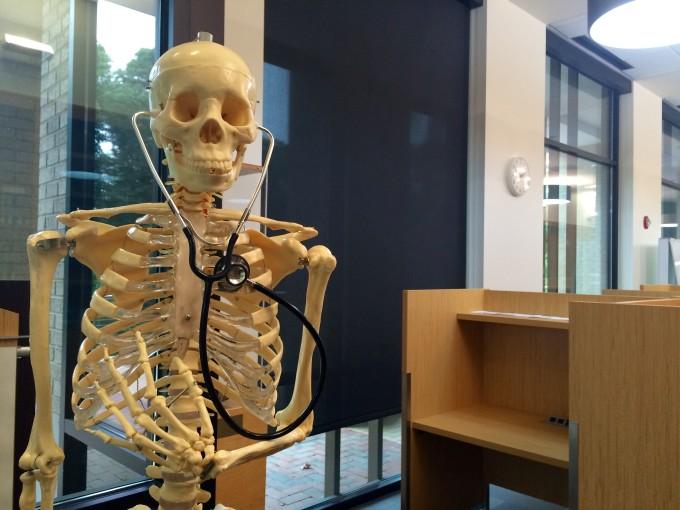
Get the latest articles delivered directly to your inbox!
Our Contributors
Class of 2022
Kyle Duke
Austin Foster
Charlotte Leblang
Ross Lordo
Class of 2021
Dory Askins
Connor Brunson
Keiko Cooley
Mason Jackson
Class of 2020
Megan Angermayer
Carrie Bailes
Leanne Brechtel
Hope Conrad
Alexis del Vecchio
Brantley Dick
Scott Farley
Irina Geiculescu
Alex Hartman
Zegilor Laney
Julia Moss
Josh Schammel
Raychel Simpson
Teodora Stoikov
Anna Tarasidis
Class of 2019
Michael Alexander
Caitlin Li
Ben Snyder
Class of 2018
Alyssa Adkins
Tee Griscom
Stephen Hudson
Eleasa Hulon
Hannah Kline
Andrew Lee
Noah Smith
Crystal Sosa
Jeremiah White
Jessica Williams
Class of 2017
Carly Atwood
Laura Cook
Ben DeMarco
Rachel Nelson
Megan Epperson
Rachel Heidt
Tori Seigler
Class of 2016
Shea Ray
Matt Eisenstat
Eric Fulmer
Geevan George
Maglin Halsey
Jennifer Reinovsky
Kyle Townsend
Join USCSOMG students on their journeys to becoming exceptional physician leaders.

Cirque du Stéthoscope*
The practice of medicine is an art and a science. Filled with drama, hope, sadness and excitement, its vocational breadth encompasses everything from the adrenaline rush of an incoming trauma alert to the excruciating bureaucracy of proper ICD-10 coding. Reaching that summit, the privilege of acting as an autonomous licensed physician—that’s mostly a circus. Thus, inspired by this blog’s “Layman’s Guide to Medical School” and the Buzzfeed listicle, GIF-imbued publications that dominate social media, here’s my take on the four-year “Cirque du Stéthoscope” that is medical education. (P.S. It’ll be a lot more fun if you click on the links.)
M1: The Contortionist
- Everything is new, and you’re trying to figure out how it all works. How is my brain supposed to hold all of this information? Is my stethoscope working? What does auscultation even mean? I have to talk to strangers about their bowel movements? You’re learning a new language. You’re exposed to the reality of the metaphor “trying to drink from a fire hydrant,” as textbooks for anatomy, physiology, immunology, biochemistry, genetics and neuroscience become your new best friends. You’re stretched to new limits intellectually, emotionally and socially as the rigors of this new adventure demands contortions of mind, body and spirit you previously thought impossible. Most importantly, you’re ardently earnest about the beginning of your journey to becoming a physician.
M2: The Human Cannonball
- That zeal for education, so infectious in the first year, is quickly replaced with a grim determination and often apathy in the face of what seems an insurmountable compendium of knowledge to ingest. Yes, more things to learn, on a deeper level, and at a faster pace. If the first year is drinking from a fire hydrant, then the second year is your entire body hurtling through the air, absorbing as much information as possible along the way. It’s a long and grinding year of studying that leads to the exciting and terrifying light at the end of the tunnel for all M2s: the infamous Step 1 .
M3: The Tightrope Walker
- You’ve made it. Clinical years, finally released into the hospital to be a “real doctor (or so you think).” Like M1, it’s a year of firsts but repeated over and again, in six-week rotation batches. It’s a perpetual highwire balancing act between competing pieces of advice. As you begin how to learn to manage and treat diseases, make sure you study hard and do well on NBME subject exams, but don’t study so much that you retreat back into the “classroom” mentality of M2. Strive to function as an independent clinician, following up on your patients, writing your own notes and presenting concise assessment and plans. On the other hand there’s the reality that you’re a student learner whose documentation doesn’t count for anything without a co-signature, you can’t put in any orders that affect patient care, and you’re perpetually asking “did the resident come by?”
M4: The Lion Tamer
- You’re at the top of the (med student) food chain. You’ve got clinical skills and you know it, and you’re enjoying the victory lap of elective rotations that comes with having decided on a specialty. Strutting your stuff on AI’s and away rotations as you wave to the crowd with one hand, while with the other hand you fend off the beast that is the final hurdle of medical school: ERAS and The Match. You’ve done it.
So that’s medical school summed up. Think the circus comes with different acts? Comment below!
*To any French speakers reading: pardon my ill-advised attempts at foreign language puns.
I grew up in the small Pee Dee town of Marion, South Carolina, before heading up to Durham, North Carolina, for an undergraduate education (and a few basketball games) at Duke University. After a year working in community health at Duke, I was primed to begin the study of medicine. USC School of Medicine Greenville’s attention to communities and commitment to teamwork brought me back to South Carolina (the amazing facilities didn’t hurt either). I’m interested in primary care and thinking about how physicians’ moral frameworks affect their practice of medicine. Most of all, I’m excited to be part of this new school and look forward to reflecting together with my classmates as we make our way through these formative years.
Transforming Medical School Blog
Copyright 2021 USC School of Medicine Greenville


